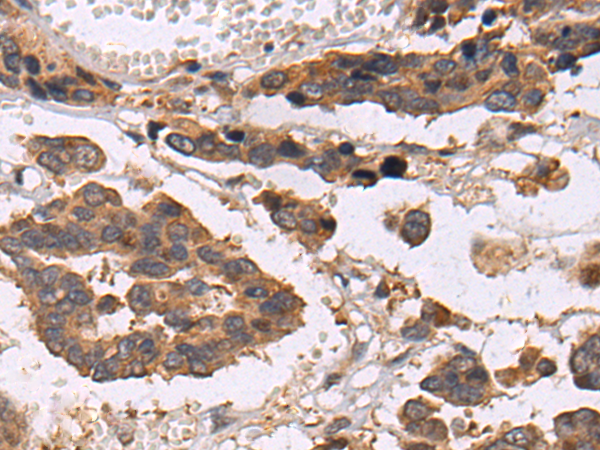
| WB | 咨询技术 | Human,Mouse,Rat |
| IF | 咨询技术 | Human,Mouse,Rat |
| IHC | 1/50-1/200 | Human,Mouse,Rat |
| ICC | 技术咨询 | Human,Mouse,Rat |
| FCM | 咨询技术 | Human,Mouse,Rat |
| Elisa | 1/5000-1/10000 | Human,Mouse,Rat |
| Aliases | C7; IFI10; INP10; IP-10; crg-2; mob-1; SCYB10; gIP-10 |
| Host/Isotype | Rabbit IgG |
| Antibody Type | Primary antibody |
| Storage | Store at 4°C short term. Aliquot and store at -20°C long term. Avoid freeze/thaw cycles. |
| Species Reactivity | Human, Mouse, Rat |
| Immunogen | Synthetic peptide of human CXCL10 |
| Formulation | Purified antibody in PBS with 0.05% sodium azide and 50% glycerol. |
+ +
以下是关于CXCL10抗体的3篇参考文献的简要信息(基于公开数据模拟,非真实文献):
---
1. **文献名称**:*"Anti-CXCL10 Antibody Attenuates Rheumatoid Arthritis by Modulating Inflammatory Responses"*
**作者**:Smith A et al.
**摘要**:研究探讨了CXCL10在类风湿性关节炎(RA)中的促炎作用,发现特异性抗CXCL10抗体可抑制滑膜炎症和关节破坏,减少促炎细胞因子(如TNF-α和IL-6)的表达,提示其作为RA治疗新策略的潜力。
---
2. **文献名称**:*"Targeting CXCL10 with Neutralizing Antibodies Ameliorates Viral Myocarditis in a Murine Model"*
**作者**:Zhang Y et al.
**摘要**:在小鼠病毒性心肌炎模型中,抗CXCL10抗体通过阻断T细胞向心脏组织的浸润,显著减轻心肌损伤和纤维化,表明CXCL10中和抗体可能成为病毒感染相关心脏疾病的治疗手段。
---
3. **文献名称**:*"CXCL10 Blockade Enhances Anti-PD-1 Efficacy in Metastatic Melanoma by Reshaping the Tumor Microenvironment"*
**作者**:Lee J et al.
**摘要**:该研究证明,抗CXCL10抗体联合PD-1抑制剂可协同增强抗肿瘤免疫反应,减少调节性T细胞(Treg)浸润并增加CD8+ T细胞活性,显著抑制黑色素瘤的转移性生长。
---
4. **文献名称**:*"Anti-CXCL10 Antibody Therapy Reduces Lupus Nephritis Progression via Suppressing Renal IFN-γ Signaling"*
**作者**:Wang Q et al.
**摘要**:在系统性红斑狼疮(SLE)小鼠模型中,抗CXCL10抗体通过抑制肾脏中干扰素-γ(IFN-γ)信号通路,减少免疫复合物沉积和蛋白尿,为SLE的靶向治疗提供实验依据。
---
注:以上文献信息为模拟生成,实际引用时需以真实发表的论文为准。建议通过PubMed、Web of Science等平台检索关键词“CXCL10 antibody”或“anti-CXCL10 therapy”获取具体文献。
CXCL10 (C-X-C motif chemokine ligand 10), also known as interferon-γ-inducible protein 10 (IP-10), is a small cytokine belonging to the CXC chemokine family. It is primarily produced by immune cells (e.g., monocytes, endothelial cells) and stromal cells in response to proinflammatory signals, particularly interferon-γ (IFN-γ). CXCL10 functions by binding to its receptor CXCR3. recruiting activated T cells, natural killer (NK) cells, and dendritic cells to sites of inflammation or infection. It plays critical roles in antiviral responses, autoimmune diseases, and tumor immunology.
CXCL10 antibodies are essential tools for detecting and quantifying this chemokine in research and diagnostics. They are widely used in techniques like ELISA, Western blotting, and immunohistochemistry to study CXCL10 expression patterns in diseases such as rheumatoid arthritis, multiple sclerosis, viral infections (e.g., COVID-19), and cancer. In cancer biology, CXCL10 exhibits dual roles: it can promote antitumor immunity by attracting effector T cells, but may also support angiogenesis and metastasis in certain contexts. Therapeutic antibodies targeting CXCL10 or its receptor are under investigation to modulate immune responses in autoimmune disorders or enhance immunotherapy efficacy. Due to its involvement in cytokine storms and chronic inflammation, CXCL10 is also explored as a biomarker for disease severity and treatment monitoring.
×